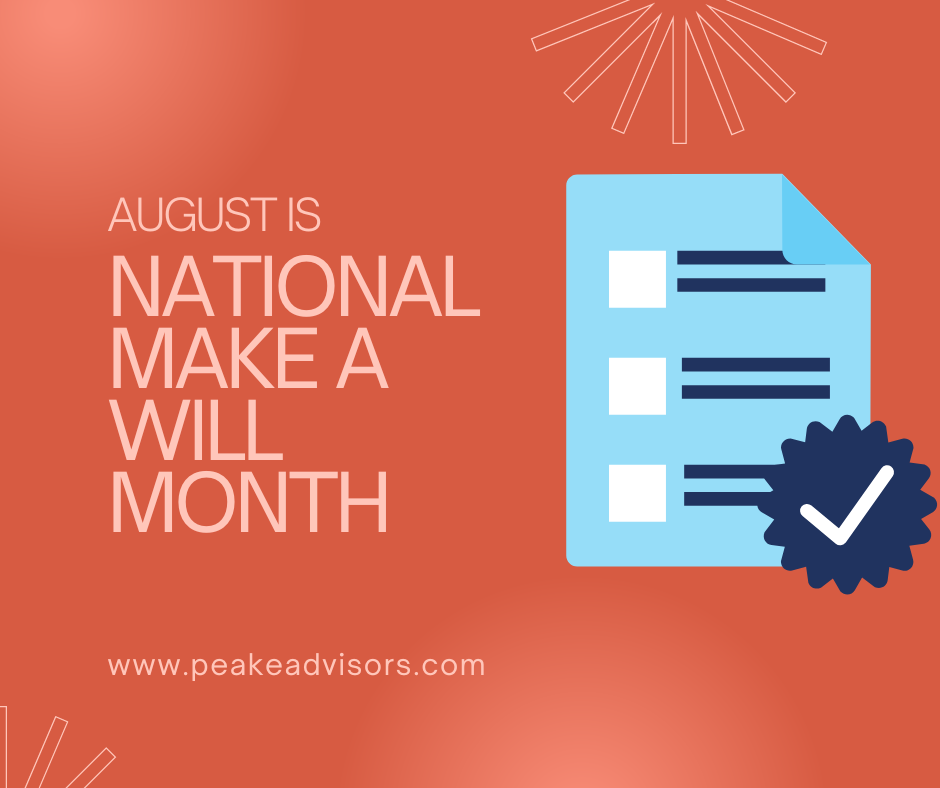
August Is National “Make a Will” Month
August is National “Make a Will” Month, and it’s a great annual reminder to update your will if needed and create a will if you don’t have one already. A will is an important estate-planning document that can help you transfer your assets with ease. Having a proper will can make the difference between a smooth transfer of assets and a probate nightmare.
Let’s learn more about what wills are, why you need one, and some tips on how to create or update your will during National “Make a Will” Month.
What Is a Will?
A will, or a Last Will and Testament, is a legal document that outlines your intention for the distribution of your assets after your death. It is an integral part of a comprehensive estate plan and helps your loved ones avoid legal and financial loopholes and know what to do with your assets. These explicit instructions are essential and can help everyone avoid a lot of headaches.
Wills vs Trusts
When you’re researching estate planning documents, you have likely come across both wills and trusts. While both documents can help dictate what you want to do with your assets when you’re gone, there is one main difference.
The primary difference between a will and a trust is that a trust takes effect as soon as it’s created and signed, while a will does so only after you pass away.1 There are also two different types of trusts to consider: irrevocable and revocable.
- Irrevocable trusts are trusts that can’t be changed or canceled after they have been signed.
- Revocable trusts can be changed, and the grantor has the right to change the terms or even end the trust.
Some other differences between wills and trusts are that a will requires probate to transfer items to beneficiaries, but trusts can avoid probate. In addition, wills are public record and trusts can remain private. Because a trust takes effect right when it’s created, it can be used if you become incapacitated and unable to make decisions independently.
Do You Need a Will?
We face so many financial obligations every day, so should creating a will be at the top of your list? Most financial experts say yes, you need a will. Even if you don’t have substantial assets to transfer, a will can still help your family feel more confident about your wishes. In addition to making the transfer of assets easier, here are a few benefits of having a will2:
- It allows you to distribute your property and protect your loved ones after you pass away.
- It can provide peace of mind to you and your family.
- You can plan for those in your care (e.g. naming a legal guardian for your children or pets).
- It may prevent family conflict.
- It can eliminate confusion over assets.
- It can ensure that your assets go to the people you want to have them.
- It can help you build a lasting legacy.
- You can use your will to benefit charity.
These are just a few of the many benefits of having a will. To celebrate National “Make a Will” Month, let’s look at how to create a will.
How to Create a Will
Creating a will can be a straightforward process, or it can involve the help of attorneys and financial advisors. Also, the process will depend on where you live because every state has different requirements for creating a will.
Generally, the first step in creating a will is to determine what you want to include. You should include instructions for passing along your assets after your death, including ownership and other instructions. You may consider working with an attorney to ensure that your will contains everything it needs.
Next, you will likely sign your will in front of two witnesses, and these two witnesses will also sign your will. Some states require a self-proving affidavit that you sign in front of a notary, other states require your will to be notarized, and some states don’t require any special self-proving documentation as long as you sign and witness your will correctly.3
Whether you have $100,000 worth of assets or $10 million, creating a will is a good idea to give your family more guidance after you pass. Wills help make the transfer of assets easier and give you and your family more peace of mind. Consider creating or updating your will this August for National “Make a Will” Month!
- https://trustandwill.com/learn/what-is-a-will
- https://www.freewill.com/learn/3-reasons-to-make-a-will-this-make-a-will-month
- https://www.nolo.com/legal-encyclopedia/california-make-will-32181.html
WE’RE HERE TO HELP
Give us a call today (410) 823-5442 or email [email protected].
For disclaimer, please follow our link below:
https://www.peakeadvisors.com/site/wp-content/uploads/2019/05/Compliance-Social-Media-Disclaimer.pdf

